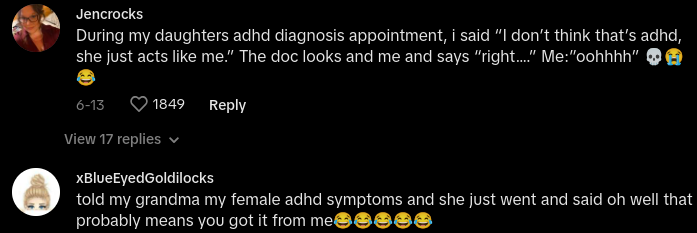“Like Father, Like Daughter”: Mom Spots Identical Autistic Traits in Husband and Their Child
"The call is coming from inside the house."
Published July 8 2024, 6:25 p.m. ET

TikToker and mother Sam (@samalamadingdong) is no stranger to going viral — and for good reason. Her videos have brought awareness to topics such as foster animals and autism — and she always manages to find the funny.
One of her most recent videos, which has racked up 5 million views, spoke to these themes in a poignant yet quirky way. Titled "like father like daughter lmao," the video features Sam discussing the similarities between her autistic child and her autistic husband, despite another family member being in denial about their condition.
In the TikTok video, Sam recounts a conversation with a family member who dismissed her daughter's autism, saying she was just smart. Sam responds, “No, she’s autistic and she’s smart,” emphasizing that two things can be true at one time. She then shares anecdotes of where her daughter picked this up from – her husband. She shares some examples. “Her dad can only wear polos that are two sizes too big because everything else is too close to his neck,” she said.
Another story involves him trying to soften butter for cookies, where Sam explains, “Her dad … is smart enough to get his PhD in economics while having three children [but] I found him literally squeezing it in his hands.” The family member then questioned her again asking, “Well, why does he think she's autistic,” to which Sam responded, “I rattled off a number of things that she deals with. And they were like, 'no, no, no, that's not autism. Her dad was exact same way as a kid.' Really?”
Sam’s point, if it isn’t obvious, is that her husband’s parents didn’t think he was autistic and now don’t think the daughter is autistic. It’s likely they grew up in a different time when the definition was murkier.

The comment section was filled with users sharing their own similar experiences, and laughing at themselves in the process. One user commented, speaking to a similar diagnosis, “You’re not bipolar, your dad is the exact same way — talk about running face first into the point and still missing it."
Another shared, “When I told my dad that I inherited my anxiety from his mother and he said, ‘She didn’t have anxiety, she was just a nervous wreck all the time’🤣," indicating that there more than a few people who were uncomfortable with specifically labeling mental health issues.
A third kept the sentimental trend rolling, "My mom: 'you don’t have ADHD, I did all the same things as you,' um ... I got some news there, mama!" These anecdotes show that Sam is not alone in her assessment and speak to accepting the nuances of neurodivergence within families.

Sam's video also touches on a broader societal issue: the increasing prevalence of autism diagnoses. According to the CDC's Autism and Developmental Disabilities Monitoring (ADDM) Network, autism rates have risen significantly over the past two decades. In 2000, the prevalence was estimated at 1 in 150 children aged 8 years. By 2020, this rate had increased to approximately 1 in 36 children.
This rise has been attributed to greater awareness, improved diagnostic criteria, and a broader definition of autism spectrum disorders. The CDC notes that the uptick in numbers is due more to increased identification of the condition rather than a true increase in its occurrence.

According to the U.K.'s National Autistic Society, around 1 out of 100 people are autistic, but the organization went on to state that there are various different factors and defining terms that technically place people on the autism spectrum.
In fact, the same article discussing autism prevalence stated that because there are so many different factors that go into establishing whether or not someone is autistic, experts believe there are even more people who fall under this spectrum than are currently estimated.

The organization wrote: "Other surveys and international estimates have come up with different prevalence estimates. Most of them suggest autism prevalence is higher. The National Autistic Society thinks the U.K. governments should do more research into autism prevalence to find an updated figure. Until that research is done, we believe that more than one in 100 people are autistic, which means more than 700,000 people in the U.K."
Sam's straight-shooting take on autism not only entertained but also educated, opening up a dialogue for families who might be in denial about their own conditions. Thanks, Sam. There’s nothing like a healthy laugh when in the face of neurodivergency.